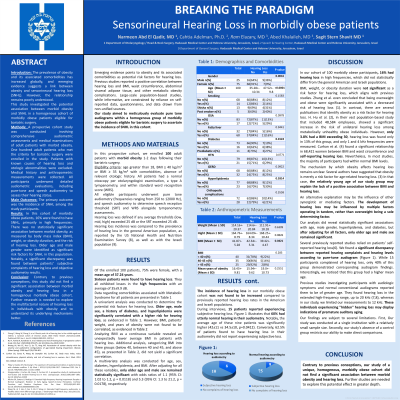Otology/Neurotology
(069) Breaking the Paradigm- Sensorineural Hearing Loss in Morbidly Obese Patients
Monday, October 2, 2023
2:45 PM - 3:45 PM East Coast USA Time


Narmeen abd el qadir, MD
Dr
Hadassah
Jerusalem, Yerushalayim, Israel
Narmeen abd el qadir, MD
Dr
Hadassah
Jerusalem, Yerushalayim, Israel
Presenting Author(s)
Co-Author(s)
Disclosure(s):
Narmeen abd el qadir, MD: No relevant relationships to disclose.
Introduction: Obesity and metabolic syndrome comorbidities have become a global pandemic. Several studies examining large databases found an association between high BMI and sensorineural hearing loss (SNHL). Nevertheless, the correlation was found only in variant subgroups, screening tests, or self-reported hearing loss, leaving unclear evidence. We aimed to determine the incidence of SNHL among homogenous morbidly obese patients
Methods: In this prospective study, audiometry was performed for morbidly obese patients undergoing bariatric surgery. All patients had normal otoscopy and no known otologic history. Data regarding demographic and comorbidities were collected. SNHL was defined as a pure-tone average >25dB in low (0.25,0.5, and 1kHz), speech (0.5,1, and 2kHz), and high (4-12kHz) frequencies.
Results: 84 patients were recruited. The average age was 37.6 years (range 18-66). Most were female (71.4%). The average BMI was 41.83+/-5.36. 44% had obesity related comorbidities (27.3% diabetes, 21% hyperlipidemia, 21% hypertension, and 17% sleep apnea). Fourteen (16.7%) had SNHL in high frequencies, of which only one had a loss in speech and low frequencies. Patients with SNHL were significantly older (47.5 vs. 35.4, p=0.0001), male (36% vs. 21%, p=0.0012), and more likely to have diabetes (57% vs. 21%, p=0.006). However, weight, BMI, and years of obesity were not significantly higher. We found no significant difference between the proportions of SNHL in our sample and the age and sex-matched prevalence reported in the USA and Israel.
Conclusions: In contrast to previous publications, morbid obesity was not associated with an increased risk for hearing loss
